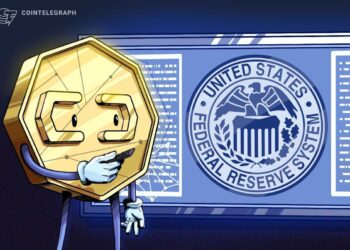Nigeria’s Securities and Trade Fee (SEC) Director-Common Emomotimi Agama stated the nation was open to stablecoin companies that adjust to native laws.
Based on a Thursday report by English-language native information outlet, The Cable, Agama stated stablecoin firms that complied with native laws have been welcome in Nigeria. “Nigeria is open for stablecoin enterprise, however on phrases that defend our markets and empower Nigerians,” he stated.
“We have now onboarded some corporations centered on stablecoin functions, all whereas guaranteeing compliance with core threat administration ideas,” Agama stated, including that these firms have been admitted by the SEC’s regulatory sandbox.
Agama made his remarks on Thursday on the Nigeria stablecoin summit in Lagos. Throughout a panel dialogue, he stated regulating stablecoins was important for Nigeria’s improvement.
Associated: Nigeria’s new crypto tax policies may not drive the revenue it needs
Nigeria bets on crypto
He emphasised that regulating stablecoins is important to Nigeria’s monetary improvement. “When the historical past books doc Africa’s monetary revolution, at the moment shall be remembered because the second we moved from potential to motion.” This echoed a latest shift in Nigeria’s approach to crypto regulation.
In late Might, a shift in native cryptocurrency regulation led Blockchain.com to announce plans to open a physical office in Nigeria, its “fastest-growing market” in West Africa. “Nigeria has taken significant steps towards creating a transparent framework for crypto,” Owenize Odia, Blockchain.com’s normal supervisor for Africa, reportedly stated on the time.
Associated: Nigerian court postpones Binance tax evasion case to end of April: Report
Nigeria’s rocky crypto previous
In March, Nigerian Data Minister Mohammed Idris stated that the various crypto companies working contained in the nation have been not facing litigation or criminal prosecution. Enforcement efforts aimed “to strengthen our legal guidelines, to not cripple anyone. We’re guaranteeing that nobody comes and operates with out regulation,” he stated.
The remarks adopted Nigeria filing an $81.5 billion lawsuit against Binance in February, claiming the trade precipitated the crash of Nigeria’s native foreign money, the naira. Native prosecutors additionally argued that Binance owed $2 billion in again taxes because the Nigerian authorities continued to grapple with smart crypto coverage.
Regardless of Nigerian authorities accusing a crypto trade of being answerable for the devaluation of the native foreign money, some officers spoke extremely of the know-how. In a March opinion article, Mohammed Idris, minister of data of Nigeria, acknowledged that “blockchain know-how and different digital property are now not on the fringes of our economic system.”
He added: “They’re quick turning into central to how our individuals transact, create and construct.”


















